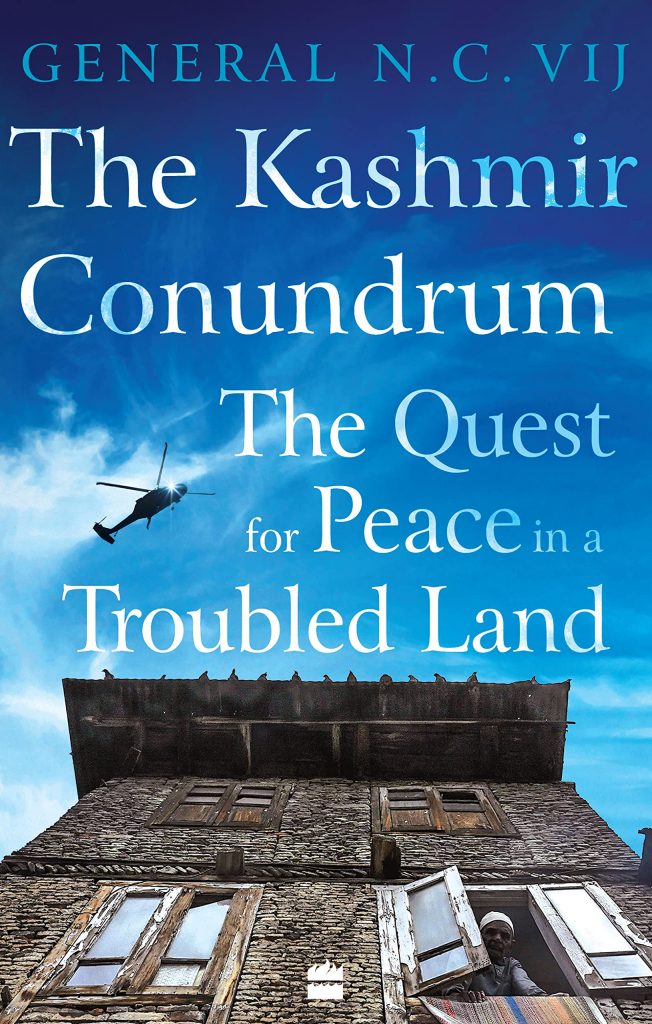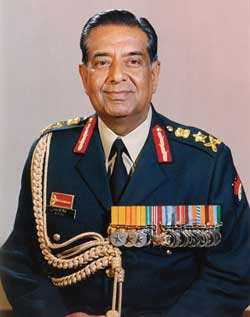
Former Chief of the Army Staff, General N C Vij’s book on Kashmir ‘The Kashmir Conundrum – The quest for peace in a troubled land‘ is a seminal work that would dominate India’s strategic community for a very long time. The excellent comprehensiveness of the book visualises Kashmir from strategic, military, political, diplomatic, social, psychological angles, and would certainly become a standard reference point in academia.
Gen. Vij had served as Director-General of Military Operations during the Kargil War. Following his retirement as the Army chief in 2005, he has served as founder-vice chairman of the National Disaster Management Authority and the Director of think tank Vivekananda India Foundation.
In this book, he traverses centuries to detail how the region has changed hands, including the reigns of emperors and invasions prior to the Treaty of Amritsar in 1846, which “marked the commencement of the history of Jammu and Kashmir as a political entity”. “To understand Jammu and Kashmir and its problems, it is important to take a historical perspective of the state to appreciate how it has impacted the nature, behaviour and psyche of the people,” Vij writes.
The book delves into the military and political history of the conflicts since India’s independence such as the Pakistani Invasion into Kashmir, India’s appeal to the UN on Kashmir, wars and conflicts of 1948, 1965, 1971, 1999 till the contemporary times.
He talks about the multilingual and multi-religious nature of the state by giving us a historical perspective of cultural bondages that exists among every socio-religious community. He describes the sentiment of Kashmiriyat as a fundamental trait that is long held as a part of Kashmir’s identity and culture and is manifested in the solidarity amongst different faiths and ethnic groups.
The book delves into the military and political history of the conflicts since India’s independence such as the Pakistani Invasion into Kashmir, India’s appeal to the UN on Kashmir, wars and conflicts of 1948, 1965, 1971, 1999 till the contemporary times. It vividly explains the role of Pakistan and its deep state in waging the proxy war against India. The genesis of the book lies in the fact it provides for a pragmatic way forward towards the complexities and smokescreens that have emerged over the past three decades, with giving out solutions to de-conflictise the economy and society of Kashmir from its double cancer of political separatism and religious radicalisation.
He makes some critical points about the initial years of the History of Jammu and Kashmir, by giving total the accession of J&K which according to him is legally and constitutionally complete. He clearly states that taking the Kashmir issue to the UN Security Council and accepting the ceasefire were major blunders. He further goes on to say that UN proposed plebiscite was impossible as Pakistan did not fulfil the conditions of the vocation of aggression. He brings out the fact that Kashmir is a mere symptom of the India-Pak differences and it arises from Pakistan’s desire for its quest for parity in terms of geographical land, resources and economic assets. This mentality can be traced back to Jinnah’s remark on the partition that they had got a “Moth-Eaten” Pakistan.
With this momentous decision, the government seemed to have closed all options for any negotiated settlement on Kashmir with the separatist parties in Kashmir and also with Pakistan - Gen NC Vij
Further, he points out that 1972 Shimla agreement which was bilaterally signed by both the countries (India-Pak) on the backdrop of a humiliating defeat that the Pakistani army had faced in its eastern front, in the Bangladesh War, a golden opportunity was missed to settle the Kashmir issue, as the Pakistani establishment’s morale was severely jolted. Another reason as to why he believes that this was a missed opportunity is, Pakistan is unlikely to desist from its proxy war against India and is determined to be hostile towards Kashmir as a policy paradigm. This worry is primarily asserted due to the current situation in Ladakh, and with China and Pakistan escalating their hostilities, which would give rise to a two-front situation, where Kashmir would become the first flaring point.
Gen NC Vij observes that India has never had a well defined and constant national strategic doctrine to tackle insurgency, which led to the increase of Pak sponsored terrorism. This is because of the lack of strategic planning in the national security establishment of the country.

He goes on to defend India’s right to retaliate with its actions during the surgical strikes and Balakot airstrikes. In his opinion, India has created a new response paradigm and would decide in its pursuit of national interest as to how, when and where to exercise its military responses weighing in, the tactical and strategic consequences. He then dwells on the contemporary issues, providing a “comprehensive and up-to-date account” on the issue, which includes an analysis of the scrapping of Article 370 by the Narendra Modi government in 2019. “With this momentous decision, the government seemed to have closed all options for any negotiated settlement on Kashmir with the separatist parties in Kashmir and also with Pakistan,” he writes.
Perhaps one of the key takeaways from the book happens to be his concerns over the failure of perception management. The conflict in Kashmir and its fallout with a miserable humanitarian crisis has consistently alienated the Kashmiris from the rest of the Indians, except for the geographical claim by the government and nationalist rhetoric by the people from the rest of India, no significant progress has been made towards the resolution of the long-standing issues. Serious efforts need to be made in order to integrate not just the valley, but the whole of Kashmir into India’s social, economic political and cultural fabric. The Kashmiri politicians are as much complicit as the government of India, in failing to resolve the Kashmir issue.
Perhaps one of the key takeaways from the book happens to be his concerns over the failure of perception management.
Former J&K Governor Jagmohan had once said “Most Kashmiri politicians are adept at speaking with two voices. They could be secular as well as communal, democratic or dictatorial, accessionist as well as pro-Pakistan, their underlying motivation is not principles, but power”. Gen Vij also echoes a similar subtone in the book. Despite all these disturbing facets Indian Army’s ‘operation sadbhavana’ has aimed to boost the perception management, and has made for a good civil-military action. But it’s just had limited success through its sub-tactical achievement. Upgrading it to a strategic level has not been possible so far. Sadbhavana at a national level with the ownership of the government of India is very important. There is a need to exploit the intellectual capital, which hasn’t been brought about so far. In fact, several strategic and defence experts are of the opinion that a communication strategy organization needs to be set up as an autonomous body, which would work with key departments and ministries to bring about the desired results in terms of strategic integration of J&K.
Kashmir is in the state of a hybrid war. Hybrid Wars are not fought in a single domain. A comprehensive approach with an evolved and resolute strategic culture becomes very critical in order to engage effectively in contemporary conflicts. As PM Modi recently said regarding the Kashmir issue, the “Dil se doori and Dilli se doori” approach needs to be adopted if the quest for peace needs to be achieved in the state.
(The author has a MA in political science and international relations. Views expressed are authors own)
Book: The Kashmir Conundrum – The quest for peace in a troubled land
Author: Gen NC Vij
Publishers: HarperCollins India
Price: INR 699.00
SW Ratings: ***1/2
Viswapramod is a PhD Scholar at the Department of International Studies and Political Science, Christ University, Bangalore. He has an MA in International Relations. Views expressed are the author’s own.
